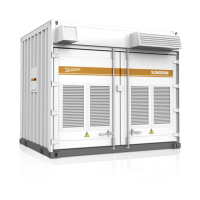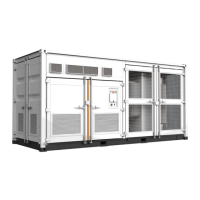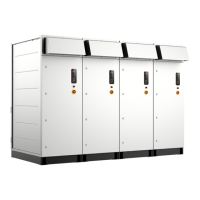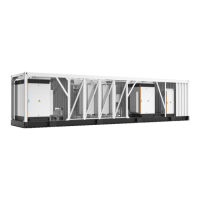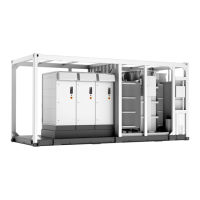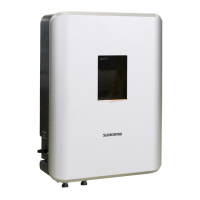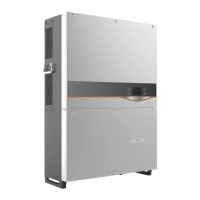18
• Avoid storing the inverter in places where corrosive gas or dust may be produced or ac-
cumulated, or in places within 30 km (20 miles) of saline-alkaline land or pollution-gener-
ating industrial complex such as chemical plants and power plants (chemical gas class:
1C1, solid particle level: 1S2). Avoid storing the inverter in environments contaminated
with halogen and sulfur pollutants.
• Do not install the inverter in places with vibration or a magnetic field strength of over 30A/
m.
• Do not store the inverter in environments with flammables and explosives.
• To prevent the inverter from being stored for an overly long period of time, please apply
the "first-in, first-out" method to product storage.
4.3.2 Protection During Storage
• During the process of product handling and storage, impacts or collisions to the product
must be avoided.
• Before storage, make sure the doors of the product and its internal devices are all locked.
During storage, avoid opening the doors, unless it is necessary.
• Seal off the product's air inlet/outlet and the DC cable inlet area. During the period of
storage, make sure the protective films on the air inlet/outlet are intact. Meanwhile, take
effective measures to prevent the ingress of rainwater, dust, and sand into the product.
• Do not have the inverter stressed with heavy weights. The containers should not be
stacked in more than four layers, and heavy weights are not allowed on the top of the in-
verter, power distribution cabinet, transformer, and protective cover for low-voltage cop-
per bars.
4.3.3 Routine Inspection for Long-term Storage
• Perform regular inspection, at least once every half a month. Check whether the dust
cover is damaged and whether the product and its internal devices are intact.
• It is suggested that units that have not been put into operation (from the date of receipt
by the customer) and the units shut down temporarily (from the date of shutdown) should
not be stored for more than three months. If stored for a long period of time, sealing
measures and necessary tests and inspections are required for the product. For products
shut down temporarily, put desiccants inside them. It is needed to open the door and vis-
ually inspect the product and its internal devices for damage first.
• For a product shut down/stored for over six months, inspect its electrical components
(IGBT module, switch, etc.), and take dehumidifcation and dedusting mesaures for the
whole product. For detailed operation, please contact SUNGROW.
4 Transport and Storage System Manual

